rushville
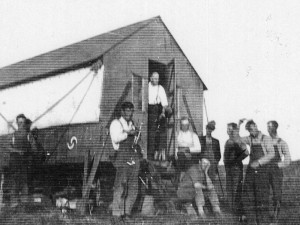 Yesterday, I came across some old pictures from my mom’s side of the family, and as I looked at the list Aunt Sandy had given me, I had to do a double take. It wouldn’t seem like it was such a big deal, because it just a picture of some unnamed ranch hands from the Flying U Ranch in Rushville, Nebraska. To someone who didn’t know anything about Rushville, Nebraska, this find would be nothing really, but I do know a little bit about Rushville, Nebraska, although I don’t recall ever having been there. I’m sure that seems odd…I mean, how could I know anything about this place if I haven’t ever been there? I could have studied about it I suppose, but for me, it is more about the people who were there at a certain time in history, than it is about the place itself.
Yesterday, I came across some old pictures from my mom’s side of the family, and as I looked at the list Aunt Sandy had given me, I had to do a double take. It wouldn’t seem like it was such a big deal, because it just a picture of some unnamed ranch hands from the Flying U Ranch in Rushville, Nebraska. To someone who didn’t know anything about Rushville, Nebraska, this find would be nothing really, but I do know a little bit about Rushville, Nebraska, although I don’t recall ever having been there. I’m sure that seems odd…I mean, how could I know anything about this place if I haven’t ever been there? I could have studied about it I suppose, but for me, it is more about the people who were there at a certain time in history, than it is about the place itself.
I have long known that some of my dad’s family settled in Rushville, Nebraska. In fact, I have written about them several times. My dad’s Great Aunt Theresa Elizabeth Spencer and her husband, William Jonathan Davis lived most of their married life in Rushville, Nebraska, and had a big ranch there. Several of their children also had ranches in the area. The name of the Davis ranch was Pine Creek, and interestingly enough, it is currently for sale, with 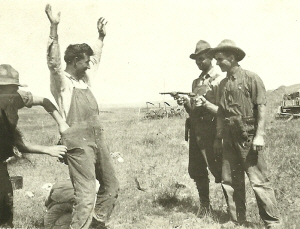 an asking price of $795,000.00, a fact that I found a bit sad, because it is a bit of my family history, and it will soon be owned by someone new, if it wasn’t already.
an asking price of $795,000.00, a fact that I found a bit sad, because it is a bit of my family history, and it will soon be owned by someone new, if it wasn’t already.
I haven’t been able to find the Flying U Ranch so far, but I know that it is…or was…in the Rushville, Nebraska area. The Flying U Ranch was not owned by my mom’s family, but it could have been. The couple who owned the ranch was getting older, and they apparently didn’t have children or children who were still living or able to take over the ranch. They really liked my grandfather, George Byer, and they told him that if he would stay there, in Rushville, they would deed the ranch to him upon their deaths. I don’t know if Grandpa didn’t like the area, or if he thought it was too long to wait and not know when he would inherit the ranch, or if he didn’t really like the ranching life, but for whatever reason, he chose not to take them up on that generous offer. I’m sure they were sorry that he didn’t, but I don’t know who they eventually gave the ranch to or if they sold it, but it did not end up in our family.
As for me, the questions that remain, are more along the lines of…Did Grandpa ever regret his decision to pass on the Flying U Ranch?…and Did he know some of the Davis family, thereby tying 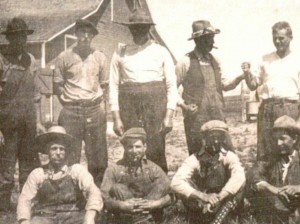 the two sides of my family together long before the marriage of my parents in 1953. He obviously had some great times on the Flying U Ranch…after all, it was there that he and some of the ranch hands took pictures of their staged robbery. They must have enjoyed spending time together just goofing off. I also have to wonder how our lives might have been different, had Grandpa taken on the Flying U ranch? I had never really considered what it might have been like if we had descended from a rancher. I don’t know that I would change anything about my life, even if I could, but it is interesting to look at the possibilities when one reflects on the fact that it really is a small world.
the two sides of my family together long before the marriage of my parents in 1953. He obviously had some great times on the Flying U Ranch…after all, it was there that he and some of the ranch hands took pictures of their staged robbery. They must have enjoyed spending time together just goofing off. I also have to wonder how our lives might have been different, had Grandpa taken on the Flying U ranch? I had never really considered what it might have been like if we had descended from a rancher. I don’t know that I would change anything about my life, even if I could, but it is interesting to look at the possibilities when one reflects on the fact that it really is a small world.
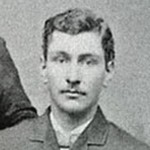 As I continue to read about my Great Great Aunt Tessie, Teresa Elizabeth Spencer Davis, I continue to be amazed at the kind of people she and her husband, William Jonathan Davis were. They raised nine children, losing a set of twins at birth, which would have made eleven children. Aunt Tessie would go on to outlive seven of her eleven children, passing away on April 21, 1944 at the age of 79 years. Her husband, William, who had been raised on the high seas, after losing both of his parents by the time he was seven, and then his Uncle Walter stepped up to raise him and his brother on his merchant ship, passed away on August 11, 1925 at the age of 69 years, having been proceeded in death by five of his children.
As I continue to read about my Great Great Aunt Tessie, Teresa Elizabeth Spencer Davis, I continue to be amazed at the kind of people she and her husband, William Jonathan Davis were. They raised nine children, losing a set of twins at birth, which would have made eleven children. Aunt Tessie would go on to outlive seven of her eleven children, passing away on April 21, 1944 at the age of 79 years. Her husband, William, who had been raised on the high seas, after losing both of his parents by the time he was seven, and then his Uncle Walter stepped up to raise him and his brother on his merchant ship, passed away on August 11, 1925 at the age of 69 years, having been proceeded in death by five of his children.
In life they were a well known and much respected couple in the community of Rushville, Nebraska. One of their prized possessions was a genuine Surrey with the fringe around the top, and a driving team of high spirited Sorrel horses. They were active in the community literary, debates, Sunday School, picnics, and Fourth of July celebrations at Palmer’s Grove. They were members of modern woodman and royal neighbors. William served on school and election boards, was elected Justice of the Peace, performed a marriage ceremony, and helped bury several people, acting as both mortician and preacher, He was supervisor of the Magnesium Road built north of the Colclessor Bridge. They were often called to neighbors homes in times of sickness and emergencies. The young son of Emile Sandoz, called them when his father was shot. William gave first aid until the doctor arrived, then formed a posse to help run down the killer. People traveling by team and wagon from the South Sandhills spent many nights in their home and were always welcome. They also allowed many peddlers to 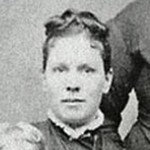 stay at their home, and the peddlers always left a gift as a token of their appreciation.
stay at their home, and the peddlers always left a gift as a token of their appreciation.
They were all gifted musicians. Aunt Tessie played the organ and sang beautifully. The children played the organ, violin, accordion, mouth harp, horns, and drums. In fact, they formed an orchestra and played at dances all over the area. They even had an organ that could be folded up like a valise in the back of a buggy. They often traveled miles to play all night until dawn. I don’t know about you, but their life wears me out, just thinking about it, much less living it, but to them, it just seemed like the normal way to live.
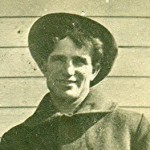 The Indian motorcycle came into being in 1901, and is noted as the first motorcycle in the United States. My grandfather, Allen Luther Spencer owned one, which he dubbed That Old Indian Motorcycle in the very early 1900’s. He decided to ride the motorcycle from Ladysmith, Wisconsin to Rushville, Nebraska to meet and visit his Aunt Tessie Spencer Davis. Because gas stations were few and far between, he would have to carry gas with him. Even then, there were times he ended up pushing the motorcycle to the next gas station, such as the point in South Dakota where he pushed it for quite a few miles after running it out of gas.
The Indian motorcycle came into being in 1901, and is noted as the first motorcycle in the United States. My grandfather, Allen Luther Spencer owned one, which he dubbed That Old Indian Motorcycle in the very early 1900’s. He decided to ride the motorcycle from Ladysmith, Wisconsin to Rushville, Nebraska to meet and visit his Aunt Tessie Spencer Davis. Because gas stations were few and far between, he would have to carry gas with him. Even then, there were times he ended up pushing the motorcycle to the next gas station, such as the point in South Dakota where he pushed it for quite a few miles after running it out of gas.
My Uncle Bill tells of a point in Nebraska, where his dad ran into a bunch of Indians, who invited him to supper. He wasn’t sure how the Indians felt about the white man at that point, so wanting to make sure he didn’t offend them, he accepted their offer. There were about a dozen Indians, with several horses and a bunch of dogs there. Indians had always had a bunch of dogs around, because they are a kind of self storing, self perpetuating food supply. The Indians picked out a rather plump dog, killed it and made a stew.
Now, I don’t know about you, but my mother always told me that when you are invited for a meal, you eat what is put in front of you. I know that  a lot of people have eaten things like snake or rabbit, and been told that it tasted just like chicken. I’ve eaten rabbit, and I do not agree. There is no similarity as far as I’m concerned. I have never eaten horse or dog meat, and I think I would have to be just about starving to death before I would consent to eat it…sorry Mom. Nevertheless, my grandfather had no desire to offend those Indians, so he ate the bowl of stew offered. After that, they offered him a second, third, and finally a fourth bowl. He pretended the stew was very good, while secretly praying they would not offer a fifth bowl. He really didn’t want to offend the men who far outnumbered him, and there was nowhere he could turn for help. Finally, they could tell that he was either very full, or maybe even a little green around the gills, so they decided that supper was over and after talking a while, they set up some tents and settled in for the night. Grandpa moved his motorcycle a little way away from their camp, and tried not to fall asleep, wanting to keep his scalp, and not knowing if they still scalped people or not. He finally fell asleep, in spite of his efforts not to, and in the morning the Indians were gone.
a lot of people have eaten things like snake or rabbit, and been told that it tasted just like chicken. I’ve eaten rabbit, and I do not agree. There is no similarity as far as I’m concerned. I have never eaten horse or dog meat, and I think I would have to be just about starving to death before I would consent to eat it…sorry Mom. Nevertheless, my grandfather had no desire to offend those Indians, so he ate the bowl of stew offered. After that, they offered him a second, third, and finally a fourth bowl. He pretended the stew was very good, while secretly praying they would not offer a fifth bowl. He really didn’t want to offend the men who far outnumbered him, and there was nowhere he could turn for help. Finally, they could tell that he was either very full, or maybe even a little green around the gills, so they decided that supper was over and after talking a while, they set up some tents and settled in for the night. Grandpa moved his motorcycle a little way away from their camp, and tried not to fall asleep, wanting to keep his scalp, and not knowing if they still scalped people or not. He finally fell asleep, in spite of his efforts not to, and in the morning the Indians were gone.
The rest of the trip was completed without further incident, and he made it to Aunt Tessie’s house, scaring her and her 7 year old daughter Ruth, when he came down the road as boldly 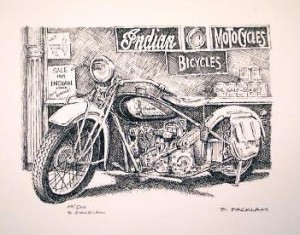 as you please. They were the only ones home, and they lived many miles from the nearest neighbor. After dismounting the motorcycle, he walked up to her front door, and when she answered, he said, “Aunt Tessie, I’m your nephew, Allen Spencer, from Wisconsin.” It was an unusual way to meet her nephew, and it might have helped if he had sent her a letter telling her he was coming, but they quickly got to know each other, and he spent several months with the family before heading back to Wisconsin. I would imagine it was a visit that Aunt Tessie never forgot.
as you please. They were the only ones home, and they lived many miles from the nearest neighbor. After dismounting the motorcycle, he walked up to her front door, and when she answered, he said, “Aunt Tessie, I’m your nephew, Allen Spencer, from Wisconsin.” It was an unusual way to meet her nephew, and it might have helped if he had sent her a letter telling her he was coming, but they quickly got to know each other, and he spent several months with the family before heading back to Wisconsin. I would imagine it was a visit that Aunt Tessie never forgot.
 Not every life is of a common type. Once in a while, circumstances come about that create a living situation or way of life that is very different, and for most of us, one that seems exotic in many ways. Such is the case my Great Great Uncle William Jonathan Davis, who married my Great Great Aunt Theresa Elizabeth Spencer on September 29, 1883 in Webster City, Iowa. Their married life was of the much more normal type. They lived several places, finally settling on a ranch near Rushville, Nebraska, where they raised their nine children. That kind of life seems very normal, and it was, but William’s childhood was far from what most of us would consider normal.
Not every life is of a common type. Once in a while, circumstances come about that create a living situation or way of life that is very different, and for most of us, one that seems exotic in many ways. Such is the case my Great Great Uncle William Jonathan Davis, who married my Great Great Aunt Theresa Elizabeth Spencer on September 29, 1883 in Webster City, Iowa. Their married life was of the much more normal type. They lived several places, finally settling on a ranch near Rushville, Nebraska, where they raised their nine children. That kind of life seems very normal, and it was, but William’s childhood was far from what most of us would consider normal.
William Jonathan Davis was born on June 5, 1856 in Llanduno, Wales. His mother Catherine Aldrich Davis died when he was two weeks old. I’m sure that over the years he felt a bit of sadness over the loss of the mother he never knew, but not as much as his older brother Charles Henry, who was a year or so older than William.
When William was seven years old, his father William Jonathan Davis Sr also passed away, leaving the two boys orphaned. Thankfully they had an uncle, Walter Davis who owned a fleet of merchant ships. He took the two boys with him on a freighter and their home was the high seas for the next eleven years. Now to a couple of little boys, I’m sure the high seas felt like quite an adventure, and life on a ship probably kept their imaginations working overtime, thus alleviating at least some of the sadness over their father’s death, by keeping them very busy. My guess is that over time, they became some of the best deck hands their Uncle Walter ever had, and they loved him dearly…so much so, in fact that William named his first son, Walter, after the uncle who saved their lives, and gave them hope for the future again.
In 1874, his uncle’s ship was delivering cargo to New York City, and Charles and William decided that it was time for them to go out on their own. After saying good bye to their uncle, the boys stayed in New York City, and then in 1875 moved to Chicago, Illinois. William got a job with the North-Western Railway Company, and was later transferred to Kamrar, Iowa as the Section Boss. It was there that he would meet the love of his life, my Great Great Aunt Theresa, or Tessie as she was lovingly nicknamed. The rest, as they say is history, as they lived happily ever after. Quite a change of lifestyle for a boy raised on the high seas.

